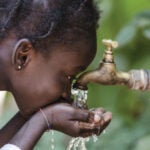The URI Department of Civil and Environmental Engineering offers foundational programs that produce outstanding practicing engineers who contribute to society throughout the northeast. Our programs develop expertise in structural engineering (buildings, bridges, materials), environmental engineering (water quality, sustainability, water and wastewater treatment, hydraulics), geotechnical engineering (foundations, retaining walls, soil behavior, in situ and laboratory testing), and transportation engineering (intelligent transportation systems, traffic, pavements). Our students benefit from participation in paid internships, global exposure through the International Engineering Program, and real world experience through an immersive capstone project with industry partners in their senior year.
Our faculty conduct pioneering research in physicochemical treatment of drinking water, microplastics, sustainable groundwater treatment technologies, water-climate links to global health, composite and cementitious materials, multi-hazard analysis and resilience modeling of coastal communities, structural and geotechnical health monitoring of offshore wind farms, and innovative foundations for floating offshore wind farms. There are many opportunities for students to engage in research and work in our state-of-the-art laboratory and field facilities.
Recent News
 Master’s Student Lands Dream Job - It’s no secret that an engineering degree often yields exciting and well-paid careers. The College of Engineering at the University of Rhode Island has long been producing global engineers that do just that. Carrie Ellis, MS ’25, had many options, but chose to forgo an industry career and instead chase a dream to work for […]
Master’s Student Lands Dream Job - It’s no secret that an engineering degree often yields exciting and well-paid careers. The College of Engineering at the University of Rhode Island has long been producing global engineers that do just that. Carrie Ellis, MS ’25, had many options, but chose to forgo an industry career and instead chase a dream to work for […]- Water for the World - These researchers say clean water is possible the world over. They are using and studying diverse technologies, from the simplest to the most advanced. But they all say changing the way we think about water is key.
 Cell Phone App Helps Battle Cholera - Professor Ali Akanda's research allows people in remote parts of the world to receive vital information about water sources contaminated with cholera.
Cell Phone App Helps Battle Cholera - Professor Ali Akanda's research allows people in remote parts of the world to receive vital information about water sources contaminated with cholera.



